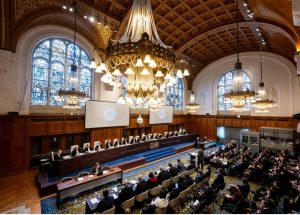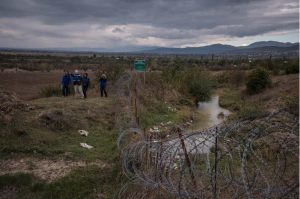ICJ Holds Public Hearings Regarding Armenia’s Preliminary Objections to Court Jurisdiction
By: Sarah Sandoval
Impunity Watch News Staff Writer
THE HAGUE, Netherlands – From April 22-26, 2024, the International Court of Justice (ICJ) heard arguments on the preliminary objections raised by Armenia in the case of Application of the International Convention on the Elimination of All Forms of Racial Discrimination (Azerbaijan v. Armenia). The delegation of Azerbaijan was led by HE Mr Elnur Mammadov, Deputy Minister for Foreign Affairs of the Republic of Azerbaijan, while the delegation of Armenia was led by HE Mr Yeghishe Kirakosyan, Representative of the Republic of Armenia on International Legal Matters.
 |
The case stems from proceedings instituted by Azerbaijan in 2021, alleging that Armenia engaged in ethnic cleansing and discrimination against Azerbaijanis. Azerbaijan accused Armenia of violating Articles Two through Seven of the International Convention on the Elimination of All Forms of Racial Discrimination (CERD).
In April of 2023, Armenia responded by raising preliminary objections to the jurisdiction of the Court and the admissibility of the claims. As a result, the proceedings were suspended pending a review of the objections. The hearing pursuant to that review concluded on April 26, 2024.
In its objections, Armenia claimed that Armenia did not consent to the jurisdiction of the Court for the full scope of Azerbaijan’s claims. Armenia attested that it only submitted to the jurisdiction of the ICJ in regard to disputes arising under the CERD. Armenia stated that First Nagorno-Karabakh War, which Azerbaijan cited, ended before the CERD was in effect and is therefore outside of the scope of jurisdiction as well as inadmissible. Armenia also claimed that the alleged use of booby traps and landmines, as well as environmental harm, do not fall under racial discrimination and are therefore not subject to the CERD. The full written objections, as well as the transcripts of the hearings, can be found on the ICJ website.
Azerbaijan asked the Court to dismiss the preliminary objections, either on the grounds that they are not valid objections or on the grounds that each should be decided on the merits. The Court will now deliberate on the objections raised by Armenia. The date of the decision will be announced at a later date.
For further information, please see:
ICJ – Conclusion of the public hearings held from Monday 22 to Friday 26 April 2024 – April 26, 2024
ICJ – Preliminary Objections of the Republic of Armenia – April 21, 2023
ICJ – The Republic of Azerbaijan institutes proceedings against the Republic of Armenia and requests the Court to indicate provisional measures – September 23, 2021
ICC Office of the Prosecutor Launches New Policy to Bolster Principles of Complementarity and Cooperation
By: Remy Kane
Impunity Watch News Staff Writer
THE HAGUE, Netherlands – On April 25, 2024, in accordance with several new policies released recently, the International Criminal Court (ICC) Office of the Prosecutor launched a new Policy on Complementarity and Cooperation. The Policy is the product of a global consultation process that began in October of last year that engaged States parties, civic society, academic institutions, and affected communities.
 |
The goal of the Policy is to fortify the ICC’s application of the Rome Statute’s principles of complementarity and cooperation. The principle of complementarity calls for collaboration between national criminal jurisdictions and the ICC. In essence, while states have primary authority to investigate and prosecute international crimes, the ICC may step in on a case-by-case basis to ensure that these crimes are justly addressed.
The new Policy is aimed toward strengthening the ICC’s relationship with other criminal jurisdictions to serve the ultimate goal of investigating and prosecuting global atrocities. To effectuate this, the Policy proposes a two-track strategy that will promote cooperation and partnership with states as well as frequent complementary action, while remaining faithful to the ICC’s mandate to independently and impartially handle Rome Statute crimes.
This approach reflects the important balance the ICC seeks to maintain between its duties and that of other jurisdictions. If this equilibrium is disrupted, however, the principle of complementarity, which is bolstered by this new Policy, allows the ICC to take action. This notion is forthright in the body of the Policy which states, “if States step up, the Office will step out. But equally, the reverse is also true. If states do not step up, the Office will not hesitate to fulfill its mandate.”
The Policy, which is referred to as a “renewed partnership for accountability,” suggests four pillars for enhanced cooperation and complementarity: (1) creating a community of practice, (2) technology as an accelerant, (3) bringing justice closer to communities, and (4) harnessing cooperation mechanisms.
Each of the new ICC policies launched in recent months have put victims and survivors of crimes at the forefront, and this one is no exception. The Deputy Prosecutor, Mame Mandiaye Niang, expressed that the Policy’s partnership-centered approach stands to deliver more for victims by way of further increased vigilance to global atrocities.
To aid in the implementation of the Policy, the Office of the Prosecutor has established a trust fund specifically dedicated to complementarity and cooperation. Contributions to this fund will support complementarity activities, such as providing information and assistance to national authorities in the implementation of their Rome Statute obligations. Further methods of deepening the ICC’s relationships with other jurisdictions will be supported by the trust fund as well, including a Complementarity and Cooperation Forum and other accountability efforts.
For Further Information, please see:
ICC – ICC Office of the Prosecutor launches policy on Complementarity and Cooperation – 25 Apr. 2024
ICC – Policy on Complementarity and Cooperation – Apr. 2024
Legal Information Institute – Complementarity defined – ND
ECHR Finds Russia Violated Multiple Human Rights Following 2008 Conflict with Georgia
By: Johannah Brown
Impunity Watch News Staff Writer
STRASBOURG, France – On April 9, 2024, the European Court of Human Rights (ECHR) delivered a judgment in the case of Georgia v. Russia (IV), where it unanimously found that Russia had committed multiple violations of human rights following its 2008 conflict between Georgia. Specifically, Russia violated Article 2, 3, 5 § 1 and 8, Article 1 and 2 of Protocol No. 1 and Article 2 of Protocol No. 4 of the European Convention on Human Rights.
 |
The conflict began in 2008 when Russia invaded Georgia and began occupying the regions of Abkhazia and South Ossetia. What followed is what is referred to as the “borderiszation” process, which restricted freedom of movement between the occupied territories and Georgia and resulted in numerous human rights abuses.
Russia erected physical barriers, installed surveillance equipment and deployed Russian border guards to the new administrative boundary line (ABL). The measures severely impacted the local Georgian population and people living near or trying to cross the administrative boundaries faced arrests, detentions, and sometimes even fatal incidents if found violating crossing rules. These barriers disrupted daily life, caused families to be separated, denied families access to their farmlands, and restricted children from accessing education in their Georgian language.
The Georgian government filed its application with the ECHR on August 22, 2018, ten years after the conflict began. The Georgian Government alleged that systematic harassment, unlawful arrests, and detention of its citizens led to widespread human rights abuses and violations of rights contrary to several Articles in the Convention of Human Rights.
The ECHR examined evidence, including victim lists, testimonies, forensic reports, and international observations and found a broader pattern of abuse that amounted to an administrative practice. In its decision, the Court noted that the complaints fell under an “administrative practice” of human rights violations, meaning a “repetition of acts incompatible with the Convention” that included an element of ‘official tolerance’ by the State.” The Court held that the Georgian Government had established beyond a reasonable doubt that these violations were officially tolerated by the Russian Government, taking note in its decision that the Russian Government had failed to participate in the proceedings and therefore there was no dispute of the facts.
With regards to Articles 2 and 3 the Court, pointed to evidence of the torture and extra-judicial killings of several residents trying to cross the border as well as the killing of seven pensioners trying to cross the ABL to collect their pension. In finding violations of Article 5, the Court pointed to evidence of at least 2,800 cases of arrest and detention for “illegally crossing.”
The ECHR’s decision comes one year after the Court ordered Russia to pay $134 Million to Georgia in compensation for the 2008 conflict. Georgian Minister of Justice Rati Bregadze commenting on the court’s decision, stated the ruling “underscored Georgia’s territorial integrity and the unlawfulness of the borderization process” and went on to say the ruling was “an important step toward the ultimate goal of achieving the complete de-occupation” of Georgia.
For further information, please see:
European Court of Human Rights – Judgment Georgia v. Russia (IV) – 9 Apr. 2024
European Court of Human Rights – Summary Judgment Georgia v. Russia – 9 Apr. 2024
ECHR Rules that Coercive Methods Used to Recruit and Exploit “Web Models” Constituted Human Trafficking
By: Karla Lellis
Visiting Impunity Watch News Writer
STRASBOURG, France – On March 12, 2024, the European Court of Human Rights (ECHR) ruled in the case of Jasuitis And Šimaitis V. Lithuania, finding that coercing women to work as “web models” constituted as human trafficking. This decision highlights the importance of legal clarity and a victim-centred approach to dealing with such exploitation, aligning with Article 7(1) of the Convention.
 |
The proliferation of internet technologies has profoundly transformed the dynamics of human trafficking. The UNODC’s 2020 Global Human Trafficking Report characterizes cyberspace as “digital hunting grounds” for traffickers, who exploit the expansive reach and anonymity of online platforms. Traffickers have skillfully leveraged digital tools to advertise deceptive job offers, promote exploitative services, and identify vulnerable individuals through social media. The rise of webcams and live streaming has further facilitated new forms of exploitation, as traffickers demonstrate a disturbing aptitude for using digital spaces to perpetuate their illicit activities.
This disturbing trend is exemplified in the Jasuitis and Šimaitis v. Lithuania case, where young women were recruited through deceptive online advertisements to work as “web models.” The victims were coerced into performing sexual acts on camera, including nudity and using sex toys, facing threats and psychological manipulation. Police investigation revealed multiple cases of exploitation, with the perpetrators providing equipment and apartments, then demanding debt repayment while closely monitoring and pressuring the women to generate income through long, exploitative work hours. Vulnerable young women facing financial, or family difficulties were specifically targeted and subjected to these abusive practices, leading to legal action against the traffickers.
In their defense, the Jasuitis and Šimaitis applicants argued that their convictions for trafficking were unpredictable, thus violating Article 7 of the European Convention on Human Rights. Article 7 reflects the principle of nulla poena sine lege (no punishment without law), which prohibits criminal sanctions for acts not clearly defined as offenses. The applicants claimed the national courts’ interpretation of trafficking laws was overly broad and lacked clarity, leading to uncertainty about the scope of liability. They argued this lack of foreseeability undermined their right to a fair trial and legal certainty under Article 7.
However, the European Court of Human Rights unanimously rejected this argument. The Court found the relevant criminal law provision, Article 147 § 1 of the Lithuanian Criminal Code, did not give rise to ambiguity, and the domestic courts’ interpretation was consistent and sufficiently precise. Crucially, the Court determined the applicants could foresee that their actions of deceiving victims and exploiting them for pornographic services would constitute a trafficking offense. The Court did not find the application of the law to be overly expansive or lacking in safeguards against arbitrary prosecution.
This ruling reinforces the ability of European states to effectively prosecute human trafficking, even as traffickers adapt their methods to the digital realm. As technology continues to transform the landscape of exploitation, robust legal frameworks and victim-centered approaches will be essential in combating this evolving menace.
For further information, please see:
ECHR – Jasuitis and Šimaitis V. Lithuania, App No. 28186/19 and 29092/19 – 12 Mar. 2024
UNDOC, Global Report on Trafficking in Perso, U.N. Doc. Sales No. E.20.IV.3 – 2020